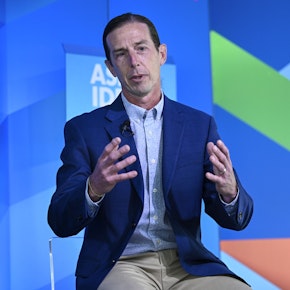Explore
Search results

The deaths of children under age five fell by 50 percent to below six million in 2015, the first time that has happened; in 1990, there were 12.7 million under-five deaths. In the same period, there have been major gains in reducing child malnutrition and improving maternal health. Those successes are a reminder that simple, affordable solutions are within reach, and that...

More than 140,000 people from more than 140 countries have told researchers just what they think and feel about science and key health challenges, such as vaccinations. Wellcome is releasing the findings for the first time at Aspen Ideas: Health. The largest such survey to date cuts across language, culture, and literacy levels to reveal how much people trust science, whet...

Although infectious disease outbreaks, from influenza to Ebola, surface with alarming frequency, more than 80% of the world has not yet developed an adequate response plan. Does your nation have one in place? Resolve to Save Lives has launched a new website that assigns an epidemic preparedness score to 180 countries, giving journalists, advocates and citizens the tools th...

Building on lessons learned from the COVID-19 pandemic, there are significant opportunities to expand the use of rapid testing to address many health challenges around the world- from infectious diseases like malaria and HIV to non-infectious health needs like prenatal care. Learn how Abbott is intentionally approaching product development to democratize, decentralize and...

While vaccine development was swift to combat COVID-19, just 60% of the global population has been fully immunized and viral variants remain a deadly threat, underscoring the importance of strengthening the “last mile” in vaccination. Ensuring equitable access to vaccines, overcoming structural obstacles to distribution, and combatting vaccine hesitancy will require cross-...

Since 2014, Aspen Ideas: Health has welcomed over 700 inspiring women leaders to our stages to share their bold approaches to better health. In honor of Women's History Month, we're taking a look back at some of the many highlights. From medical researchers and clinicians to entrepreneurs and activists, meet 12 change makers who are breaking barriers to reimagine a healthi...

Eighteen months after a COVID-19 vaccine became available, high-income countries had administered more than 200 doses per 100 people; in low-income countries, the figure was almost 90 percent less. Access to diagnostics and therapies has been likewise constricted, underscoring the imperative of new approaches to global health equity. Investing in local manufacturing and sc...


Rick Doblin wants to be a legally licensed psychedelic therapist. Learn about his work using MDMA, or ecstasy, to help people suffering from PTSD.

As the planet warms, wildfires will proliferate in forests, grasslands, and even urban areas — threatening flora, fauna, and finances around the globe. The good news is that we aren’t helpless, even in the face of all-consuming conflagrations. Leading fire scientists share the best strategies we have for managing — and ultimately taming — the flames.

What would happen if genetic sequencing were standard care for undiagnosed diseases? And how can we ensure that the future of genomics benefits everyone, not just the one percent?

Pharmaceutical advances are expanding, with some exciting new drugs already on the market and others ready to emerge from the pipeline. These therapeutics offer fresh hope for combatting perilous infections, such as multi-drug resistant tuberculosis, and neglected tropical diseases, which affect more than one billion people every year. But it takes more than product devel...

In a wide-ranging interview with PBS anchor Judy Woodruff, best-selling author Atul Gawande explores some of the most pressing issues in health and medicine today. Informed by his experiences as a practicing physician and a lucid staff writer for The New Yorker, Gawande brings a deeply humanist perspective to topics such as making surgery safer across the globe, how health...

Seth Berkley, the CEO of GAVI, talks about the importance of vaccines in addressing global health challenges, the role of public-private partnerships in tackling inequities, and new advances in vaccine development.

As the COVID-19 virus began to burn across the globe last year, virologist Nathan Wolfe had been studying how viruses cross over from wild animals to humans. He was also among the scientists and public health experts sadly prescient about something that is now abundantly clear: The world is woefully unprepared to prevent the spread of novel viral threats. In this conversat...

For health researchers, space is proving to be a unique laboratory to explore stem cells, pharmaceuticals, 3D bioprinting, food science, and more. TRISH's Dorit Donoviel, an Aspen Ideas: Health 2023 speaker, explains how collaboration and open science can help advance these "out-of-this-world" discoveries for all mankind.

The Afternoon of Conversation is the Aspen Ideas Festival's pinnacle programming moment. Over 2,000 people gather in the Benedict Music Tent, an open-air venue with acoustics that mimic an amphitheater, to hear from global leaders, community change-makers, journalists, politicians, and more. Doors open at 2 p.m.

Jennifer Doudna and her Berkeley lab collaborators are not alone in their quest to understand nature. As scientists with profound curiosity, leaders of labs across the globe have found themselves in an intense race to determine how to manipulate our genetic makeup, designing new technologies that can alter the course of disease or even design a human child. But with the de...

Universal health care involves much more than providing insurance coverage to everyone. It also means ensuring that appropriate, affordable, and timely medical services are available to all, in keeping with the view of health as a fundamental human right. In the US, the framework of Medicare for All is gaining traction. Health workers in Mali are working deep within commun...

Will AI bring in robot doctors? Chat GPT: “Yes, these robots can assist in various healthcare tasks, such as diagnosing illnesses, performing surgeries, or providing personalized care to patients.” How will AI be regulated? Chat GPT: “Regulatory approaches may vary between countries, but the overarching goal is to strike a balance between fostering innovation and safeguard...

